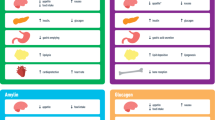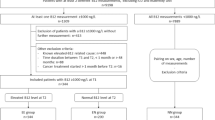Abstract
Objectives: To determine the efficacy of oral iodized oil in goitrous children who are both selenium (Se) and iodine deficient; to investigate if Se status modifies the response of iodine deficient, goitrous children to oral supplementation with iodized oil.
Design: A longitudinal intervention trial.
Setting: Two rural villages in the western Côte d'Ivoire.
Subjects: 51 goitrous non-anemic schoolchildren with both iodine and Se deficiency.
Intervention: Each child received an oral dose of 0.4 ml iodized poppyseed oil containing 200 mg of iodine. They were followed for 1 y with measurements of urinary iodine (UI), thyrotropin (TSH), thyroxine (T4), and thyroid volume by ultrasound.
Results: At baseline all children were goitrous and Se deficient; median UI was 29 μg/l and mean serum Se (s.d.) was 14.8 (10.7) μg/l. After receiving iodized oil, thyroid volume decreased significantly vs baseline at 10, 15, 30 and 50 weeks (P<0.001). At 50 weeks mean percentage change in thyroid volume from baseline was−46.6% and only five children remained goitrous. Median TSH values at 5, 10, 15, 30 and 50 weeks were reduced significantly (P<0.001) compared to baseline. Among individual children the severity of Se deficiency predicted the degree of response to iodized oil. Baseline serum Se and percentage change in thyroid volume from baseline at 50 weeks were strongly correlated (r2=0.554). Baseline Se and percentage decrease in TSH from baseline at 30 weeks were also well-correlated (r2=0.467).
Conclusion: Although more severe Se deficiency partially blunts the thyroid response to iodine supplementation, oral iodized oil is an effective method for iodine repletion in goitrous children who are Se deficient.
Sponsorship: The Swiss Federal Institute of Technology, Zürich, the Foundation for Micronutrients in Medicine, Rapperswil, Switzerland, and the Thrasher Research Fund, Salt Lake City, USA.
European Journal of Clinical Nutrition (2000)54, 209–213
This is a preview of subscription content, access via your institution
Access options
Subscribe to this journal
Receive 12 print issues and online access
$259.00 per year
only $21.58 per issue
Buy this article
- Purchase on Springer Link
- Instant access to full article PDF
Prices may be subject to local taxes which are calculated during checkout
Similar content being viewed by others
Author information
Authors and Affiliations
Contributions
Guarantor: MB Zimmermann.
Contributors: All contributors participated in the design of the study. MBZ, PA and CZ did the field work. MBZ, PA, CZ and TT did the laboratory analyses, and MBZ and TT the statistical analyses. All contributed to the writing and/or editing of the manuscript.
Corresponding author
Rights and permissions
About this article
Cite this article
Zimmermann, M., Adou, P., Torresani, T. et al. Effect of oral iodized oil on thyroid size and thyroid hormone metabolism in children with concurrent selenium and iodine deficiency. Eur J Clin Nutr 54, 209–213 (2000). https://doi.org/10.1038/sj.ejcn.1600921
Received:
Revised:
Accepted:
Published:
Issue Date:
DOI: https://doi.org/10.1038/sj.ejcn.1600921
Keywords
This article is cited by
-
Association of serum selenium with thyroxin in severely iodine-deficient young children from the Amhara region of Ethiopia
European Journal of Clinical Nutrition (2016)
-
Serum Selenium Levels in Euthyroid Nodular Thyroid Diseases
Biological Trace Element Research (2016)
-
Soil-to-Human Mineral Transmission with an Emphasis on Zinc, Selenium, and Iodine
Springer Science Reviews (2015)
-
Selenium Deficiency a Factor in Endemic Goiter Persistence in Sub‐Saharan Africa
World Journal of Surgery (2011)
-
Serum concentration of Selenium in healthy individuals living in Tehran
Nutrition Journal (2005)



